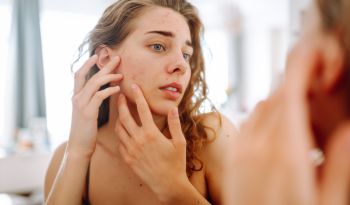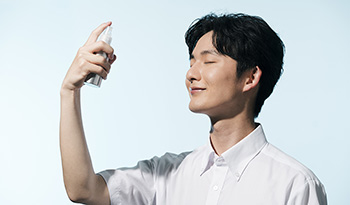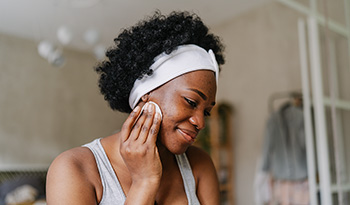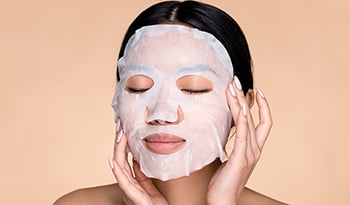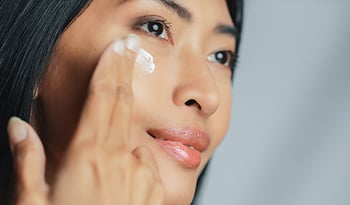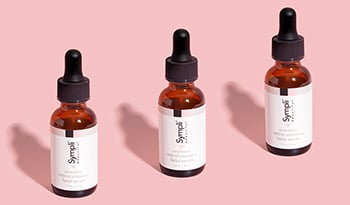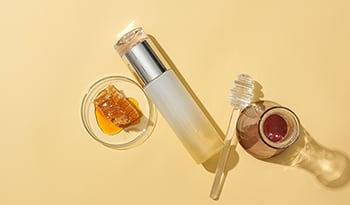Reverse Signs of Skin Aging: 7 Science-Based Approaches
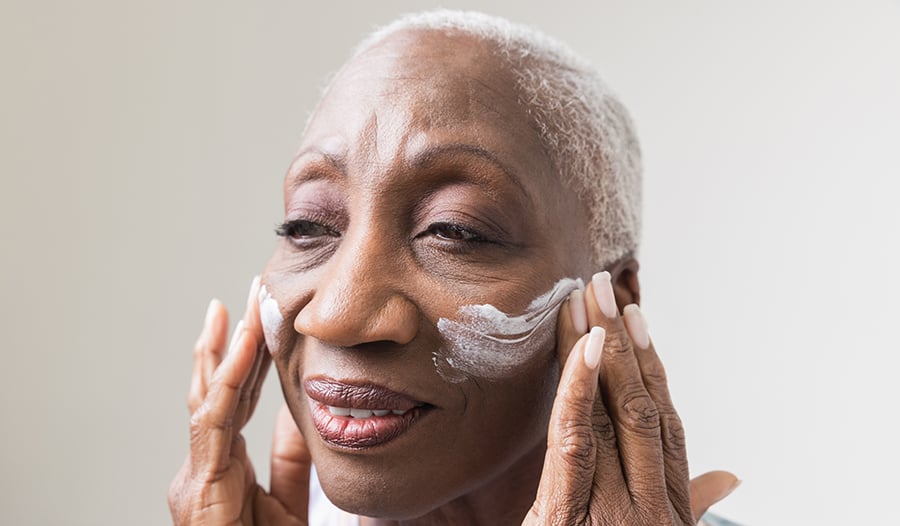
In the quest for youthful, radiant skin, the topic of skin aging often takes center stage. Our skin undergoes several changes as we age, including developing wrinkles, sagging, and uneven tone.
According to a 2012 cross-sectional study, your facial appearance and skin wrinkling in regions that are shielded from the sun can indicate your potential to live to a very old age. Your facial appearance can also reflect your risk of cardiovascular disease (the leading cause of death globally), regardless of your age, smoking habits, sun exposure, or body mass index.
This article will discuss some evidence-based strategies to promote healthy skin and delay or improve signs of skin aging.
1. Moisturizer That Contains Ceramides And Nicotinamide
Ceramides
Ceramides are long-chain fatty acids produced by the sebaceous glands and found naturally in the stratum corneum (outer layer) of the skin. They are essentially the glue that holds our skin cells together and keeps our skin barrier intact and healthy. Ceramides strengthen the permeability barrier function of the skin in order to prevent water loss and penetration of harmful chemicals from the environment. The levels of ceramides in the skin decrease with age, resulting in skin dryness and wrinkling as well as a reduced ability of skin barrier function to recover. Ceramide levels also decrease upon exposure to environmental factors such as cold weather (during winter) and ultraviolet (UV) B radiation, over-exfoliation, or certain skin conditions like atopic dermatitis or psoriasis that involve dryness and barrier disruption.
A 2019 randomized controlled trial amongst 24 individuals with xerosis (dry skin) reported that 28 days of twice-daily application of a ceramide-containing moisturizer on one side of the shin improved skin hydration, barrier function, skin pH, wrinkles, and texture.
Nicotinamide
Nicotinamide—also known as niacinamide or nicotinic acid amide—is the active, water-soluble form of vitamin B3. Nicotinamide improves skin barrier function by decreasing water loss through the outer layer of the skin (known as the epidermis), thereby increasing skin hydration. It also enhances complexion by improving the pigmentation, blotchiness, and redness of aging skin.
2. Daily Sunscreen
The skin is directly affected by UV radiation from the sun. Sun-exposed skin ages differently than skin that has aged naturally over time. Natural chronological aging typically leads to fine wrinkles and thinning, and the skin usually appears smooth, while sun-induced skin aging (known as photoaging) causes dry, leathery skin with irregular pigmentation, coarse wrinkles, and a buildup of degraded elastic material in the inner layer of the skin. Researchers have estimated that 80-90% of visible aging signs could be attributed to UV exposure (photoaging) rather than chronological aging.
Fortunately, there is strong scientific evidence that daily sunscreen use prevents photoaging. For example, a 2013 study of 903 adults younger than 55 years who were randomized into one of four groups reported that those randomized to apply sunscreen daily showed no detectable increase in skin aging after 4.5 years. Daily sunscreen application also resulted in 24% less skin aging than discretionary sunscreen application. In a follow-up 2016 study amongst 32 individuals who applied a broad-spectrum sunscreen daily to their entire face, all photoaging parameters—such as skin texture, clarity, and mottled and discrete pigmentation—improved after as little as 12 weeks, and these improvements continued until week 52. An additional benefit of sunscreens is their efficacy in reducing the risk of skin cancers such as melanomas and squamous cell carcinomas.
Chemical and mineral sunscreens
Broadly, sunscreen ingredients are divided into either mineral sunscreens or chemical sunscreens. The main difference between them lies in their response to sunlight. Mineral (or physical) sunscreens contain titanium dioxide and zinc oxide. These compounds create a barrier on your skin that reflects UV light, essentially acting as a shield to deflect the sun’s rays. Conversely, chemical sunscreens contain at least one of 12 FDA-approved carbon-containing ingredients that absorb UV rays before they reach your skin, thereby acting like a sponge.
Mineral sunscreens, which have an excellent safety profile, offer broad-spectrum protection (against both UVA and UVB rays) and are often recommended for people with skin sensitivities. The drawbacks are that they might be too thick and heavy for those with oily skin, they are less water-resistant than chemical sunscreens, they are hard to apply, and they can leave a white cast to the skin. Microsized ‘nanoparticles’ of titanium dioxide and zinc oxide are easier to apply and leave less white residue on the skin.
Chemical sunscreens offer better protection than mineral sunscreens against UV radiation. Compared to mineral sunscreens, chemical sunscreens have a lighter consistency and are easier to wear. They are also better at resisting water and sweat, so they are preferable during physical activity in the sun or swimming. However, they might not be suitable for those with sensitive skin because the chemical ingredients could exacerbate skin conditions like rosacea, psoriasis, or eczema.
Safety concerns with chemical sunscreens
It is important to critically address concerns regarding sunscreens. Some human trials reported that the active ingredients in chemical sunscreens are absorbed into the blood after topical application. This raised concerns, especially because single cell and mouse studies showed that these ingredients are endocrine disruptors that interfere with hormone levels and responses. However, a 2020 review concluded that there is not enough evidence to support the claim that elevated blood levels of oxybenzone (BP-3) and octinoxate (OMC)—two common ingredients found in chemical sunscreens—cause adverse health outcomes. Nevertheless, the review mentions that further well-designed human studies are required to determine whether these absorbed chemicals are harmful to humans. Presently, the American Academy of Dermatology states that “the FDA’s current recommendations are based on current scientific evidence, and the science doesn’t show that any sunscreen ingredients currently available in the U.S. are harmful to human health.” Despite this, people still prefer to use mineral sunscreen ingredients like zinc oxide because even though it does not offer as good protection against the sun's UV radiation, it is not absorbed through the skin.
A chemical sunscreen ingredient called bemotrizinol (bis-ethylhexyloxyphenol methoxyphenyl triazine) offers good protection against the different UV wavelengths, and it does not get absorbed across the skin because it is large. However, even though it has been available in the European Union since 2000 and marketed in Europa and Australasia under the brand name Tinosorb S and Escalol S, it is not currently FDA-approved. However, it is hoped that bemotrizinol will gain FDA approval in mid-2024.
For now, the best sunscreen for you is the one you prefer and can apply daily.
General photoprotection
In addition to applying daily sun protection factor (SPF) ≥ 30 broad-spectrum sunscreen to exposed skin, preventing photoaging also involves staying in the shade when outdoors, wearing a wide-brimmed hat and photoprotective clothing if possible, wearing sunglasses, avoiding peak sunshine hours between 10 am and 4 pm, avoiding other sources of UV light (such as tanning beds), and staying cautious around snow, water and sand that reflect the sun’s damaging rays.
Exposure of bare skin to the sun helps our bodies generate vitamin D. If you take measures to protect yourself against direct exposure to UV rays from the sun, monitor your vitamin D levels to prevent deficiencies, and consider supplementing with 1000 IU/day vitamin D3 if your vitamin D levels are low.
3. A Diet Rich In Whole Foods, Lean Protein, Fiber, And Unsaturated Fats
One randomized controlled trial in 256 participants showed that a calorie-restricted Mediterranean diet that also restricted processed and red meats and that was richer in plants and polyphenols—and supplemented with 28 g/day of walnuts plus 3–4 cups/day of green tea and 500 ml of Mankai—was associated with lower biological aging. Further, a 2020 review discussed the Mediterranean diet as a strategy to prevent frailty and slow down the progression of aging, whilst a 2023 review described how plant-based diets promote healthy skin by preventing photoaging, improving skin firmness and elasticity, and decreasing facial wrinkles and skin pigmentation. These papers reinforce the existing guidelines on diet and skin health that state that “a Mediterranean-style diet rich in plant-based foods featuring plentiful fresh fruit and vegetables, herbs, nuts, beans, and whole grains; moderate amounts of seafood, dairy, poultry, and eggs; and occasional red meat is associated with good skin health.”
Therefore, a good diet is unquestionably crucial for good skin health. No diet works perfectly for everybody, but regardless of the specific diet type and eating patterns, there are some fundamental principles to note.
These include focusing predominantly on whole, unprocessed foods, eating sufficient lean protein and fiber, and swapping saturated fats for unsaturated fats like extra-virgin olive oil, walnuts, and avocados. The essential nutrients are best obtained via whole foods as opposed to supplements, but the latter can be particularly helpful for people with nutrient deficiencies.
4. Oral Collagen Peptide Supplements
Collagen is the most abundant protein in the body, and it is made up of high concentrations of three amino acids, namely glycine, proline, and hydroxyproline. Enzymes break down collagen into smaller bioactive peptides, which are the main forms of collagen used in supplements. These peptides are easily absorbed in the digestive tract before entering the bloodstream.
A 2020 systematic review of 10 publications reportedthe benefits of intact or hydrolyzed collagen on skin moisture, elasticity, wrinkle number, and dryness. Similarly, a 2022 randomized controlled trial in 100 individuals showed that oral supplementation with low-molecular-weight collagen peptides improved crow’s feet, wrinkles (by 8%), skin elasticity, skin hydration, skin roughness, and barrier integrity of photoaged facial skin.
Do collagen peptide supplements confer additional benefits if you eat enough protein?
The short answer is yes.
Collagen peptides are short chains of amino acids (the building blocks of proteins). Therefore, some critics argue that there is no added benefit of supplementation with collagen peptides if you are consuming enough protein because both strategies supply our bodies with amino acids.
However, as described in a 2023 meta-analysis of 26 randomized controlled trials involving 1,721 patients, we have specific peptide transporters that allow collagen peptides to be absorbed and reach the skin, where they stay for much longer than they do in other parts of the body, resulting in significant improvements in skin hydration and skin elasticity. A randomized controlled trial in 31 male burn patients showed that a hydrolyzed collagen-based supplement for four weeks improved wound healing.
Taken together, and in addition to meeting protein targets, collagen peptide supplements show benefits for skin aging and are usually dosed at 10-15 g per day.
5. Oral Hyaluronic Acid Supplements
Hyaluronic acid (hyaluronan), a naturally occurring substance in the human body, is abundantly present in the skin, joints, and eyes. It plays a crucial role in ensuring that tissues remain moist and well-lubricated. Despite its significant presence in the skin, the amount of hyaluronic acid decreases with age. For example, a 75-year-old individual has only 25% of the hyaluronic acid in their skin compared to a 19-year-old. Fortunately, as with collagen, clinical studies have demonstrated that oral supplementation of hyaluronic acid improves skin hydration, tone, thickness, elasticity, firmness, luster, and suppleness while also reducing wrinkles and protecting against dehydration.
There have been safety concerns around the fact that hyaluronic acid could enhance cancer growth. However, a 2014 study in mice with cancer showed no detrimental effects of oral hyaluronic acid supplementation on tumor proliferation and metastasis. Human trials lasting at least 12 months have also reported no safety issues.
When high-molecular-weight hyaluronic acid is ingested, gut bacteria break it down into shorter low-molecular-weight fragments that eventually reach the skin. Both high- and low-molecular-weight hyaluronic acid reduce skin wrinkles and improve skin luster and suppleness. The current literature suggests that the molecular weight of hyaluronic acid in supplements might not significantly impact its benefits, but more research is warranted. Typical doses used in human trials range from 80 mg to 200 mg per day.
Putting it all together, an example of a morning skincare routine would be to take a shower, apply a moisturizer and wait a few minutes before applying a sunscreen (that ideally contains bemotrizinol). Next, you could consume a healthy breakfast followed by an oral 10-15 g collagen peptides supplement and an oral 200 mg hyaluronic acid supplement.
6. Resistance Exercise
Physical exercise is a key strategy for achieving a longer and healthier lifespan. The plethora of benefits on physical and psychological health that exercise offers are well known. Higher physical fitness is consistently associated with a lower risk of death, and exercise is akin to a polypill that positively impacts the hallmarks of aging.
The advantages of exercise on organs like the heart, brain, and muscles are widely acknowledged, but the effects of exercise on skin health are poorly understood. An interesting 2023 study in healthy, sedentary middle-aged Japanese women showed that both aerobic and resistance exercise improved skin elasticity, enhanced the structure of the upper dermis (the inner layer of the skin), and reduced levels of inflammatory factors in the blood. However, resistance but not aerobic training also improved the thickness of the dermis. These findings reiterate the importance of resistance training (‘weights’ or ‘strength’ training) for skin health.
7. Retinoid Night Creams
What are retinoids?
Vitamin A is a fat-soluble vitamin that is essential for various bodily functions. It exists in several forms known as retinoids, which are natural or synthetic forms of vitamin A and that share the same biological features as vitamin A. Retinoids include retinol (the alcohol form of vitamin A), retinoic acid (the active form of vitamin A), adapalene, tazarotene, retinaldehyde, and retinyl esters. Retinoids play an important role in maintaining skin health because they stimulate cells to produce more collagen fibers, and they improve the blood supply to the skin. Indeed, retinoids can prevent and repair clinical features of photoaging. Retinoids are added to skin creams, lotions, and serums due to their ability to promote skin health, but they differ in strength and effectiveness.
Types of retinoids
Retinoic acid (tretinoin) is significantly stronger than retinol because it directly enhances skin health by promoting cellular renewal, turnover, and DNA damage repair. Specifically, tretinoin combats photoaging, smoothens out wrinkles, evens skin tone, and increases skin firmness. Tretinoin is regulated by the FDA and normally requires a prescription.
Retinol, a less potent retinoid than tretinoin, requires enzymatic conversion into retinoic acid upon skin application. This process results in slower and less conspicuous effects compared to tretinoin, but it has still been shown to improve fine wrinkles and increase collagen production with less skin irritation than tretinoin. Retinol is typically available over-the-counter in many skincare products.
Adapalene works just as well as tretinoin for photoaging and wrinkles. It is normally used at a concentration of 0.3%. Adapalene is the least irritating topical retinoid for the skin.
Topical tazarotene, which is used at a concentration of 0.05- 0.1%, is FDA-approved for psoriasis, acne, and photoaged skin (pigmentation problems and wrinkling).
Caution with retinoid creams
Be careful when you start to use retinoid creams because they can irritate the skin.
- A good idea would be to use one every 2-3 nights when you start off to allow your skin to get used to it. Some people prefer to use a retinoid cream only once or twice a week.
- Make sure you wear sunscreen in the morning.
- Do not mix retinoid creams with other products such as exfoliants (see below), especially when you initially start using retinoid creams. On the nights you use products such as exfoliants, do not use retinoid creams.
8. Exfoliants Containing Alpha Hydroxy Acids
A 2023 review discussed the research progress on skin aging and promising active ingredients. Amongst them were the exfoliants lactic acid and glycolic acid, which are both known as alpha hydroxy acids.
Lactic acid increases collagen synthesis and skin elasticity, and it reduces skin pigmentation as well as pore size. A 1996 study showed that 12% lactic acid for three months increased skin firmness, thickness, and smoothness, and improved lines and wrinkles.
Glycolic acid is an organic acid that can reduce UVB-induced cellular inflammation and aging. It can also prevent wrinkles and offer overall cosmetic skin benefits.
In support of this, the clinical guidelines state that alpha hydroxy acids can affect deeper skin layers when used at higher concentrations and for longer. They enhance the regeneration of collagen and elastin, making fine lines less obvious.
Conclusions
From supplements to creams and lifestyle habits, these science-backed strategies can help support the overall appearance of your skin. There is growing interest in strategies to reverse or slow down visible signs of aging, not just for aesthetic reasons but because how our skin looks reflects our chances of living a long life. In this case, prevention is better than cure. While individual results might vary, incorporating these practices can contribute to healthier skin and help prevent or improve signs of skin aging.
As with any supplement, it is important to consult with a relevant healthcare professional before starting a skin health supplement to ensure it is safe and suitable for your individual needs.
References:
- Gunn DA, De Craen AJM, Dick JL, Tomlin CC, Van Heemst D, Catt SD, et al. Facial Appearance Reflects Human Familial Longevity and Cardiovascular Disease Risk in Healthy Individuals. The Journals of Gerontology: Series A. 2013 Feb;68(2):145–52.
- www.heart.org [Internet]. [cited 2024 Mar 12]. Heart and Stroke Statistics. Available from: https://www.heart.org/en/about-us/heart-and-stroke-association-statistics
- Rittie L, Fisher GJ. Natural and Sun-Induced Aging of Human Skin. Cold Spring Harbor Perspectives in Medicine. 2015 Jan 1;5(1):a015370–a015370.
- Gilchrest BA. A review of skin ageing and its medical therapy. British Journal of Dermatology. 1996 Dec;135(6):867–75.
- Griffiths CEM. The clinical identification and quantification of photodamage. British Journal of Dermatology. 1992 Sep;127(S41):37–42.
- Uitto J. The role of elastin and collagen in cutaneous aging: intrinsic aging versus photoexposure. J Drugs Dermatol. 2008 Feb;7(2 Suppl):s12-16.
- Langton AK, Sherratt MJ, Griffiths CEM, Watson REB. Review Article: A new wrinkle on old skin: the role of elastic fibres in skin ageing. Intern J of Cosmetic Sci. 2010 Oct;32(5):330–9.
- Farage MA, Miller KW, Elsner P, Maibach HI. Intrinsic and extrinsic factors in skin ageing: a review. Intern J of Cosmetic Sci. 2008 Apr;30(2):87–95.
- Südel KM, Venzke K, Mielke H, Breitenbach U, Mundt C, Jaspers S, et al. Novel Aspects of Intrinsic and Extrinsic Aging of Human Skin: Beneficial Effects of Soy Extract. Photochem Photobiol. 2004;2004-06-16-RA-202.
- Flament F, Bazin R, Rubert, Simonpietri, Piot B, Laquieze. Effect of the sun on visible clinical signs of aging in Caucasian skin. CCID. 2013 Sep;221.
- Photo of 92-Year-Old’s Face and Neck Shows 40 Years’ of Sun Damage [Internet]. [cited 2024 Mar 13]. Available from: https://www.businessinsider.com/woman-sunscreen-face-neck-40-years-sun-damage-photo-2022-9
- Boyd AS, Naylor M, Cameron GS, Pearse AD, Gaskell SA, Neldner KH. The effects of chronic sunscreen use on the histologic changes of dermatoheliosis. Journal of the American Academy of Dermatology. 1995 Dec;33(6):941–6.
- Hughes MCB, Williams GM, Baker P, Green AC. Sunscreen and Prevention of Skin Aging: A Randomized Trial. Ann Intern Med. 2013 Jun 4;158(11):781.
- Randhawa M, Wang S, Leyden JJ, Cula GO, Pagnoni A, Southall MD. Daily Use of a Facial Broad Spectrum Sunscreen Over One-Year Significantly Improves Clinical Evaluation of Photoaging. Dermatol Surg. 2016 Dec;42(12):1354–61.
- Sander M, Sander M, Burbidge T, Beecker J. The efficacy and safety of sunscreen use for the prevention of skin cancer. CMAJ. 2020 Dec 14;192(50):E1802–8.
- Sunscreens: A Complete Overview — DermNet [Internet]. [cited 2024 Mar 13]. Available from: https://dermnetnz.org/topics/topical-sunscreen-agents
- Matta MK, Zusterzeel R, Pilli NR, Patel V, Volpe DA, Florian J, et al. Effect of Sunscreen Application Under Maximal Use Conditions on Plasma Concentration of Sunscreen Active Ingredients: A Randomized Clinical Trial. JAMA. 2019 Jun 4;321(21):2082.
- Wang J, Pan L, Wu S, Lu L, Xu Y, Zhu Y, et al. Recent Advances on Endocrine Disrupting Effects of UV Filters. IJERPH. 2016 Aug 3;13(8):782.
- LaPlante CD, Bansal R, Dunphy KA, Jerry DJ, Vandenberg LN. Oxybenzone Alters Mammary Gland Morphology in Mice Exposed During Pregnancy and Lactation. Journal of the Endocrine Society. 2018 Aug 1;2(8):903–21.
- Schlumpf M, Cotton B, Conscience M, Haller V, Steinmann B, Lichtensteiger W. In vitro and in vivo estrogenicity of UV screens. Environ Health Perspect. 2001 Mar;109(3):239–44.
- Suh S, Pham C, Smith J, Mesinkovska NA. The banned sunscreen ingredients and their impact on human health: a systematic review. Int J Dermatology. 2020 Sep;59(9):1033–42.
- Sunscreen FAQs [Internet]. [cited 2024 Mar 13]. Available from: https://www.aad.org/media/stats-sunscreen
- Yaskolka Meir A, Keller M, Hoffmann A, Rinott E, Tsaban G, Kaplan A, et al. The effect of polyphenols on DNA methylation-assessed biological age attenuation: the DIRECT PLUS randomized controlled trial. BMC Med. 2023 Sep 25;21(1):364.
- Capurso C, Bellanti F, Lo Buglio A, Vendemiale G. The Mediterranean Diet Slows Down the Progression of Aging and Helps to Prevent the Onset of Frailty: A Narrative Review. Nutrients. 2019 Dec 21;12(1):35.
- Flores-Balderas X, Peña-Peña M, Rada KM, Alvarez-Alvarez YQ, Guzmán-Martín CA, Sánchez-Gloria JL, et al. Beneficial Effects of Plant-Based Diets on Skin Health and Inflammatory Skin Diseases. Nutrients. 2023 Jun 22;15(13):2842.
- Collagen | DermNet [Internet]. [cited 2024 Mar 13]. Available from: https://dermnetnz.org/topics/collagen
- Iwai K, Hasegawa T, Taguchi Y, Morimatsu F, Sato K, Nakamura Y, et al. Identification of Food-Derived Collagen Peptides in Human Blood after Oral Ingestion of Gelatin Hydrolysates. J Agric Food Chem. 2005 Aug 1;53(16):6531–6.
- Barati M, Jabbari M, Navekar R, Farahmand F, Zeinalian R, Salehi‐Sahlabadi A, et al. Collagen supplementation for skin health: A mechanistic systematic review. J of Cosmetic Dermatology. 2020 Nov;19(11):2820–9.
- Kim J, Lee SG, Lee J, Choi S, Suk J, Lee JH, et al. Oral Supplementation of Low-Molecular-Weight Collagen Peptides Reduces Skin Wrinkles and Improves Biophysical Properties of Skin: A Randomized, Double-Blinded, Placebo-Controlled Study. Journal of Medicinal Food. 2022 Dec 1;25(12):1146–54.
- Pu SY, Huang YL, Pu CM, Kang YN, Hoang KD, Chen KH, et al. Effects of Oral Collagen for Skin Anti-Aging: A Systematic Review and Meta-Analysis. Nutrients. 2023 Apr 26;15(9):2080.
- Shigemura Y, Kubomura D, Sato Y, Sato K. Dose-dependent changes in the levels of free and peptide forms of hydroxyproline in human plasma after collagen hydrolysate ingestion. Food Chemistry. 2014 Sep;159:328–32.
- Bagheri Miyab K, Alipoor E, Vaghardoost R, Saberi Isfeedvajani M, Yaseri M, Djafarian K, et al. The effect of a hydrolyzed collagen-based supplement on wound healing in patients with burn: A randomized double-blind pilot clinical trial. Burns. 2020 Feb;46(1):156–63.
- Laurent TC, Fraser JR. Hyaluronan. FASEB J. 1992 Apr;6(7):2397–404.
- Meyer LJM, Stern R. Age-Dependent Changes of Hyaluronan in Human Skin. Journal of Investigative Dermatology. 1994 Mar;102(3):385–9.
- Longas MO, Russell CS, He XY. Evidence for structural changes in dermatan sulfate and hyaluronic acid with aging. Carbohydrate Research. 1987 Jan;159(1):127–36.
- Gao Y, Wang R, Zhang L, Fan Y, Luan J, Liu Z, et al. Oral administration of hyaluronic acid to improve skin conditions via a randomized double‐blind clinical test. Skin Research and Technology. 2023 Nov;29(11):e13531.
- Oe M, Sakai S, Yoshida H, Okado N, Kaneda H, Masuda Y, et al. Oral hyaluronan relieves wrinkles: a double-blinded, placebo-controlled study over a 12-week period. CCID. 2017 Jul;Volume 10:267–73.
- Michelotti A, Cestone E, De Ponti I, Pisati M, Sparta E, Tursi F. Oral intake of a new full-spectrum hyaluronan improves skin profilometry and ageing: a randomized, double-blind, placebo-controlled clinical trial. European Journal of Dermatology. 2021 Dec;31(6):798–805.
- Seino S, Takeshita F, Asari A, Masuda Y, Kunou M, Ochiya T. No Influence of Exogenous Hyaluronan on the Behavior of Human Cancer Cells or Endothelial Cell Capillary Formation. Journal of Food Science [Internet]. 2014 Jul [cited 2024 Feb 28];79(7). Available from: https://ift.onlinelibrary.wiley.com/doi/10.1111/1750-3841.12500
- Tashiro T, Seino S, Sato T, Matsuoka R, Masuda Y, Fukui N. Oral Administration of Polymer Hyaluronic Acid Alleviates Symptoms of Knee Osteoarthritis: A Double-Blind, Placebo-Controlled Study over a 12-Month Period. The Scientific World Journal. 2012;2012:1–8.
- Oe M, Mitsugi K, Odanaka W, Yoshida H, Matsuoka R, Seino S, et al. Dietary Hyaluronic Acid Migrates into the Skin of Rats. The Scientific World Journal. 2014;2014:1–8.
- Mandsager K, Harb S, Cremer P, Phelan D, Nissen SE, Jaber W. Association of Cardiorespiratory Fitness With Long-term Mortality Among Adults Undergoing Exercise Treadmill Testing. JAMA Netw Open. 2018 Oct 19;1(6):e183605.
- Rebelo-Marques A, De Sousa Lages A, Andrade R, Ribeiro CF, Mota-Pinto A, Carrilho F, et al. Aging Hallmarks: The Benefits of Physical Exercise. Front Endocrinol. 2018 May 25;9:258.
- Pinckard K, Baskin KK, Stanford KI. Effects of Exercise to Improve Cardiovascular Health. Front Cardiovasc Med. 2019 Jun 4;6:69.
- Konopka LM. How exercise influences the brain: a neuroscience perspective. Croat Med J. 2015 Apr;56(2):169–71.
- Distefano G, Goodpaster BH. Effects of Exercise and Aging on Skeletal Muscle. Cold Spring Harb Perspect Med. 2018 Mar;8(3):a029785.
- Nishikori S, Yasuda J, Murata K, Takegaki J, Harada Y, Shirai Y, et al. Resistance training rejuvenates aging skin by reducing circulating inflammatory factors and enhancing dermal extracellular matrices. Sci Rep. 2023 Jun 23;13(1):10214.
- Zasada M, Budzisz E. Retinoids: active molecules influencing skin structure formation in cosmetic and dermatological treatments. pdia. 2019;36(4):392–7.
- Milani M, Colombo F. Skin Anti-Aging Effect of Oral Vitamin A Supplementation in Combination with Topical Retinoic Acid Treatment in Comparison with Topical Treatment Alone: A Randomized, Prospective, Assessor-Blinded, Parallel Trial. Cosmetics. 2023 Oct 18;10(5):144.
- Chung JH, Eun HC. Angiogenesis in skin aging and photoaging. The Journal of Dermatology. 2007 Sep;34(9):593–600.
- Griffiths CEM. The role of retinoids in the prevention and repair of aged and photoaged skin: Retinoids and ageing. Clinical and Experimental Dermatology. 2001 Oct;26(7):613–8.
- Mukherjee S, Date A, Patravale V, Korting HC, Roeder A, Weindl G. Retinoids in the treatment of skin aging: an overview of clinical efficacy and safety. Clinical Interventions in Aging. 2006 Dec;1(4):327–48.
- Kafi R, Kwak HSR, Schumacher WE, Cho S, Hanft VN, Hamilton TA, et al. Improvement of Naturally Aged Skin With Vitamin A (Retinol). Arch Dermatol [Internet]. 2007 May 1 [cited 2024 Mar 13];143(5). Available from: http://archderm.jamanetwork.com/article.aspx?doi=10.1001/archderm.143.5.606
- Bagatin E, Gonçalves HDS, Sato M, Almeida LMC, Miot HA. Comparable efficacy of adapalene 0.3% gel and tretinoin 0.05% cream as treatment for cutaneous photoaging. European Journal of Dermatology. 2018 May;28(3):343–50.
- Rendon MI, Barkovic S. Clinical Evaluation of a 4% Hydroquinone + 1% Retinol Treatment Regimen for Improving Melasma and Photodamage in Fitzpatrick Skin Types III-VI. J Drugs Dermatol. 2016 Nov 1;15(11):1435–41.
- Topical retinoids (vitamin a creams) | DermNet [Internet]. [cited 2024 Mar 13]. Available from: https://dermnetnz.org/topics/topical-retinoids
- He X, Wan F, Su W, Xie W. Research Progress on Skin Aging and Active Ingredients. Molecules. 2023 Jul 20;28(14):5556.
- Oh S, Seo SB, Kim G, Batsukh S, Son KH, Byun K. Poly-D,L-Lactic Acid Stimulates Angiogenesis and Collagen Synthesis in Aged Animal Skin. IJMS. 2023 Apr 28;24(9):7986.
- Bohnert K, Dorizas A, Lorenc P, Sadick NS. Randomized, Controlled, Multicentered, Double-Blind Investigation of Injectable Poly-l-Lactic Acid for Improving Skin Quality. Dermatol Surg. 2019 May;45(5):718–24.
- Smith WP. Epidermal and dermal effects of topical lactic acid. Journal of the American Academy of Dermatology. 1996 Sep;35(3):388–91.
- Tang SC, Tang LC, Liu CH, Liao PY, Lai JC, Yang JH. Glycolic acid attenuates UVB-induced aquaporin-3, matrix metalloproteinase-9 expression, and collagen degradation in keratinocytes and mouse skin. Biochemical Journal. 2019 May 31;476(10):1387–400.
- Santos‐Caetano JP, Vila R, Gfeller CF, Cargill M, Mahalingam H. Cosmetic use of three topical moisturizers following glycolic acid facial peels. J of Cosmetic Dermatology. 2020 Mar;19(3):660–70.
- Alpha hydroxy acid facial treatments | DermNet [Internet]. [cited 2024 Mar 13]. Available from: https://dermnetnz.org/topics/alpha-hydroxy-acid-facial-treatments
DISCLAIMER:This Wellness Hub does not intend to provide diagnosis...

















































































 Table of Contents
Table of Contents



